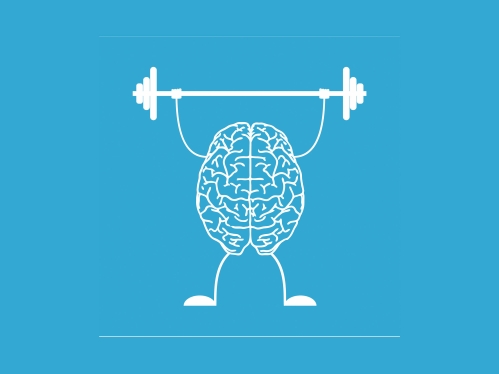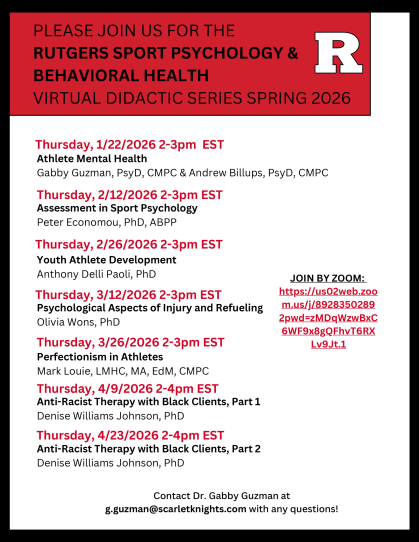
Sport and Performance Psychology
Sport and Performance Psychology Certificate Program
The Department of Applied Psychology at GSAPP offers advanced training in sport and performance psychology, which can be taken as part of a student’s curriculum during undergraduate or graduate training. The purpose of the Sport and Performance Psychology Certificate is:
1). To educate and train participants about the relevant body of knowledge that has to do with sport and performance psychology.
2). To assure that participants learn how to practice sport and performance psychology by providing them with instruction and supervised experiences in creating projects, dissertations, and other learning activities that will help them acquire particular knowledge, skills, and abilities in areas of assessment, intervention, consultation, evaluation, professional business planning, organizational analyses, and other related domains.
3). To generate new information about the application of psychology to sport and performance, particularly in the service of the development and performance enhancement of athletes, coaches, parents, administrators, organizations, the performing arts and other relevant performance-based activities.
The Certificate provides an opportunity for the individual to apply as a candidate for the Certified Mental Performance Consultant (CMPC) of the Association of Applied Sport Psychology.

Admission Requirements
Admission is open across various disciplines, and while graduate students are given priority, it is possible for undergraduate students to apply. Students with a graduate degree in Psychology or a related field (e.g., Clinical or Counseling Psychology, School Psychology, Organizational Psychology, Kinesiology, Exercise Science, Athletic Training, Education, Leadership and Sport Management) are also given priority. Applicants are required to submit:
1). All transcripts
2). Personal statement
3). One letter of recommendation
Required credits (15 credits)
* Please note that GRE scores are NOT required.

Courses
Sport and Performance Psychology Stand-Alone Certificate
-

^ One of the four courses are acceptable, or other courses that aligns with the AASP requirements and are approved by the Director.
*Sport Science courses depend on course offerings from Kinesiology
**Practicum is optional and possible for advanced students that apply and are accepted into the training program, only.
Courses
Sport and Performance Psychology Certificate
-
This course focuses on the application of a systematic approach for performance-based techniques as it pertains to the assessment, intervention, and consultation of individual athletes, teams, coaches, administrators, and sport organizations. Particular attention is given to the development of a professional practice in sport psychology.
-
The purpose of the course is to educate practitioners on the multifaceted aspects of sports psychology, especially as it pertains to the conceptual and theoretical developments, current status of empirical research, and principles and procedures of professional practice. As a result of this course, students will have the opportunity to become knowledgeable about sport psychology and its role in the practice of professional psychology. The course covers underlying theory in the practice of sports psychology, the research methods used to enhance the science, and clinical applications as it applies to clinical interventions working with athletes, as well as other high performers including people in the performing arts, executives, and law enforcement.
-
Civic and global citizenship, social justice, and cultural diversity: This course consists of graduate level material to prepare students to address issues related to multiculturalism and various issues of diversity. As the material within the topics of civic and global citizenship, social justice, and cultural diversity are constantly changing, the course material is variable depending on the political climate, the instructor, and other social justice issues within the American and global cultures. Research related to microagressions, racism, prejudice, social justice, and issues of diversity will form the framework of the course.
-
This course is designed to introduce students to the diagnosis, causal factors, and treatments of the major psychological disorders in childhood, adolescence, and adulthood. Historical and contemporary conceptions of abnormal behavior will be explored as well as controversies within the field regarding the classification, assessment, and treatment of psychological disorders. Behavioral, cognitive, interpersonal, sociocultural, genetic, and biological/neuroscience aspects of psychopathology will be covered as appropriate. The course will emphasize descriptive psychopathology (e.g., phenomenology, epidemiology, natural course of disorder). Issues of etiology, treatment, access to mental health services, and cultural issues to be considered will also be covered.
-
Organizational Interventions at the Individual Level: Introduction to a disciplined, theory-based approach to executive coaching emphasizing multilevel forces impacting individual behavior. Student will apply theory and methods learned through readings, class discussion and case study analysis to a supervised Executive Coaching project.
-
Reviews basic research and theory concerning work and careers; examines various strategies for improving the quality of life at work and promoting optimal career development.
-
The undergraduate course in Exercise Psychology is designed to cover (a) psychological and neurobiological responses to exercise that help to advance our understanding of the effects of exercise on mental health and well-being; (b) psychological theories for understanding and predicting health-oriented exercise and physical activity behavior; and (c) interventions and strategies that have shown promise for increasing physical activity participation and behavioral adherence.
-
Practica are defined as field practice (either through internal practica housed at GSAPP or external practica at other sites) pursued under the intensive on-site supervision of practitioner supervisors. The practicum experience will vary according to the student's training level, the course work taken, and the experiences available at the particular site. Practica are designed to provide you with the opportunity to practice what has been and is being learned through course work, as well as an opportunity to learn directly from experienced field supervisors. Students can learn about possible clinical practica through the annual Practicum Fair. Clinical and School students are approved for these positions by the GSAPP Coordinator of Practicum Placements.
*Completion of the performance psychology certificate can be satisfied by other electives as approved by program director.
Apply
Start Your Journey Today

